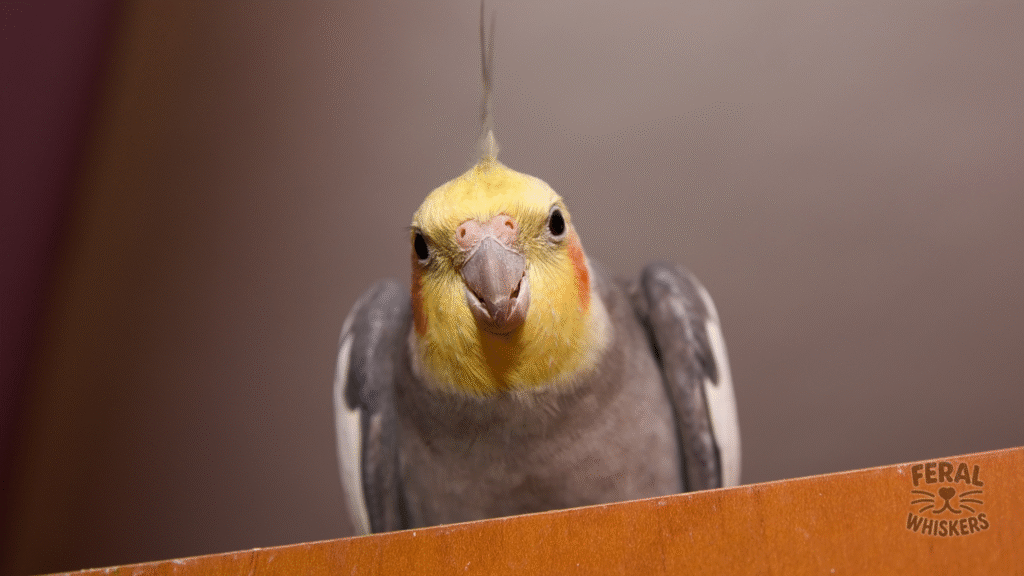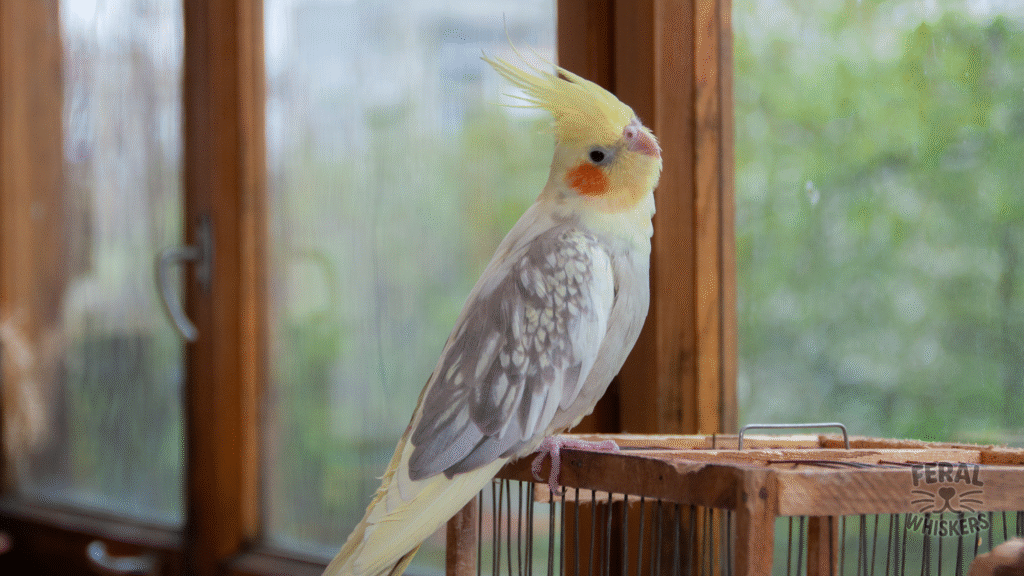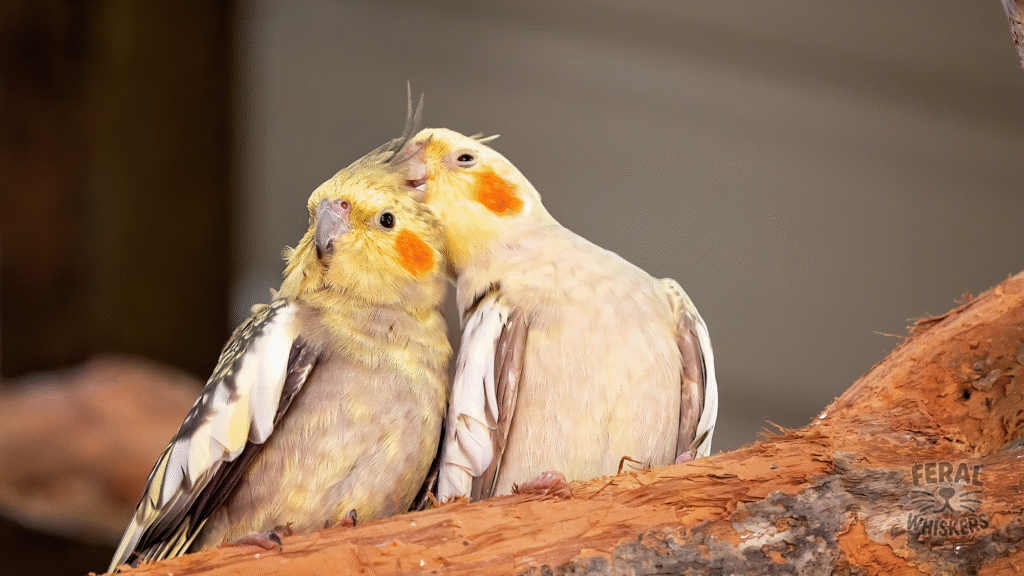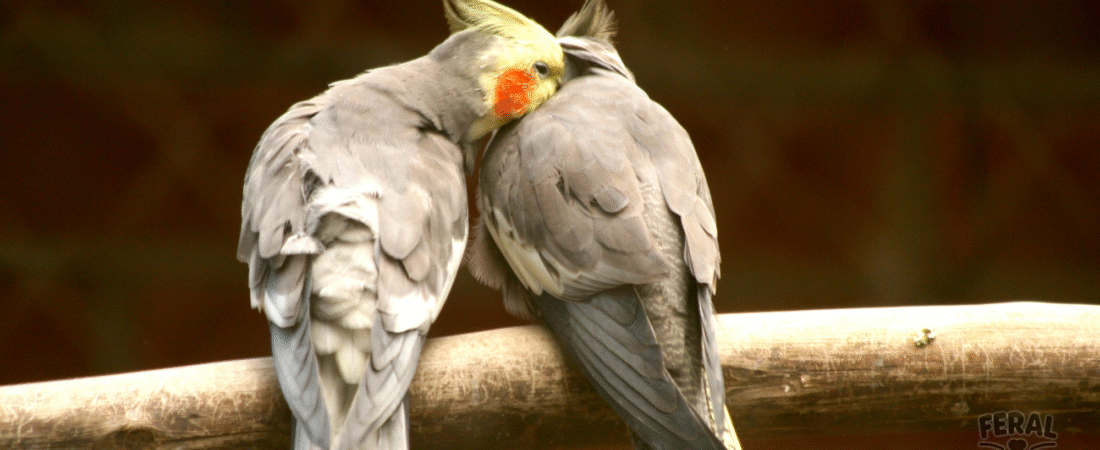Meet the Cockatiel

Cockatiels (Nymphicus hollandicus) are one of the most popular pet birds in the world. Known for their gentle nature, cute crests, and whistling talents, these small parrots make wonderful companions for both new and experienced bird owners.
Originating from the open grasslands and scrublands of Australia, cockatiels are hardy, social, and expressive. They’re small enough to be manageable, but smart and affectionate enough to form strong bonds with their humans.
1. Lifespan and Personality
- Average lifespan: 15–20 years with proper care (some live beyond 25 years).
- Size: 12–13 inches from beak to tail, weighing about 80–120 grams.
- Personality: Gentle, affectionate, curious, and playful. Many enjoy head scratches, mimicking sounds, and spending time on shoulders.
- Noise level: Quieter than larger parrots, but males can whistle and sing loudly.
- Bonding: Cockatiels thrive on social interaction and form strong bonds with their owners.
Fun Fact: Male cockatiels are often more “talkative” (whistle, mimic tunes), while females are generally quieter but equally affectionate.
2. Diet: What Cockatiels Eat
A good diet is the foundation of health.
Ideal Cockatiel Diet
- Pellets (60–70%): Specially formulated cockatiel pellets are the healthiest base.
- Fresh Vegetables (20%): Leafy greens (kale, spinach), carrots, broccoli, bell peppers, and squash.
- Fruits (10%): Apples, berries, melons, and mango (always seedless and in moderation).
- Seeds: Cockatiels love seeds, but too many cause obesity. Offer sparingly as treats, or as part of a balanced mix.
- Protein Boosts (occasionally): Cooked egg, beans, or small amounts of cooked chicken.
- Fresh Water: Always available, changed daily.
Foods to Avoid (TOXIC)
- Avocado
- Chocolate
- Caffeine (coffee, tea, soda)
- Alcohol
- Onions/garlic
- Salt and sugary foods
- Apple seeds and cherry pits
3. Housing and Environment
Cage Setup
- Size: Minimum 24” x 24” x 24”, but bigger is always better.
- Bars: Horizontal bars help with climbing.
- Perches: Provide natural wood perches of different thicknesses; avoid sandpaper perches.
- Toys: Rotating toys (bells, shreddables, ropes, foraging toys) keep them stimulated.
- Cage location: Place in a family area (living room), away from drafts, kitchens, or direct sunlight.
Free Flight Time
Cockatiels need at least 2–3 hours a day of supervised out-of-cage time for exercise and bonding.
Grooming Needs
- Nail trimming every few months.
- Bathing: Offer a shallow dish or mist spray — cockatiels love to bathe.
- Beak care: If diet is good, beaks naturally stay healthy with chewing toys.
4. Training & Communication

Cockatiels are intelligent and enjoy learning.
Training Basics
- Step Up Command: Teach them to step on your finger for easy handling.
- Recall Training: Call them by name to fly (or walk) to you.
- Trick Training: Wave, spin, or target training with positive reinforcement.
Bonding Tips
- Speak softly and consistently.
- Hand-feed treats (like millet) to build trust.
- Be patient — some cockatiels are shy until they feel safe.
Talking & Singing
- Singing: Males often whistle and learn tunes quickly.
- Talking: Some cockatiels will learn words, but their speech is not as clear as larger parrots.
5. Health and Wellness
Common Signs of Illness
- Fluffed-up feathers, lethargy
- Sitting at the bottom of the cage
- Loss of appetite or excessive drinking
- Changes in droppings (color, consistency)
- Labored breathing, tail bobbing
- Discharge from nose or eyes
- Feather plucking or bald patches
When to See a Vet: Immediately if you notice any of the above. Birds hide illness until it’s advanced.
Common Cockatiel Health Issues
- Respiratory infections (from drafts, smoke, poor air quality).
- Obesity (seed diets and lack of exercise).
- Egg binding (in females).
- Psittacosis (parrot fever) — a zoonotic disease requiring urgent treatment.
Holistic Health Prevention
- Provide a varied diet and clean environment.
- Avoid scented candles, Teflon/non-stick cookware fumes, and cigarette smoke.
- Natural sunlight or full-spectrum lighting helps vitamin D absorption.
- Minimize stress with consistent routines.
6. Is a Cockatiel Right for You?
YES, if you want:
- A gentle, affectionate bird.
- A bird that loves whistling and light chatter over loud screams.
- Manageable size and care requirements compared to large parrots.
MAYBE NOT, if you:
- Want a bird that talks a lot (speech is limited).
- Can’t commit to daily social time and interaction.
- Are sensitive to light daily chirping/whistling.

7. FAQs for New Cockatiel Owners
Q1: How long do cockatiels live?
15–20 years with good care, sometimes over 25.
Q2: Do they need a companion cockatiel?
Not strictly, but they are very social. A single cockatiel can thrive with dedicated human interaction; in busy households, a second cockatiel may provide companionship.
Q3: Do cockatiels bite?
Yes, like all parrots, they can, but most cockatiels are gentle. Biting usually happens from fear, stress, or lack of trust.
Q4: Can cockatiels talk?
Some can, but their speech is limited and not as clear as larger parrots. They are much better whistlers and mimics of sounds.
Q5: How much attention do they need?
At least a few hours daily. Socialization is key to preventing loneliness and behavioral issues.
Q6: Do cockatiels make good beginner birds?
Yes! They are often considered one of the best “starter parrots” because of their manageable size, sweet temperaments, and ease of care.
8. Fun Facts About Cockatiels
- Cockatiels are the smallest member of the cockatoo family.
- Their crest feathers are excellent mood indicators — upright for curiosity, flat for aggression, relaxed for calmness.
- The male cockatiel often sings to attract mates, while females usually make softer chirps.
- Some cockatiels can learn to wolf whistle, mimic doorbells, or even imitate the microwave beep!
Final Takeaway
Cockatiels make loving, joyful companions for the right household. They thrive when given proper diet, enrichment, and willingness to bond daily. Their long lifespan means they’re a true family commitment, but the reward is a bird that sings to you, snuggles for scratches, and becomes part of your everyday life.
With patience, positive training, and proper care, your cockatiel can live a long, healthy, and happy life by your side.

